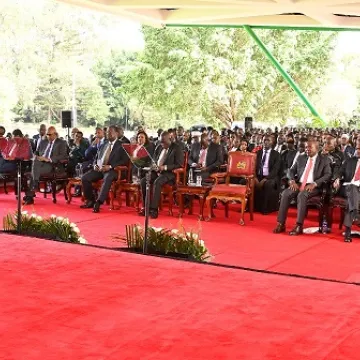Reforms targeting wastage and redundancy won't cost jobs — State

President William Ruto chairs the first Cabinet meeting of 2025 at State Lodge, Kakamega.
In a fresh move to overhaul Kenya's public sector, the Cabinet has approved the consolidation of 42 State corporations into 20 agencies. According to the Cabinet dispatch of Tuesday, these reforms aim to address financial inefficiencies, reduce dependency on taxpayer funding, and optimize service delivery.
However, the decision, which also includes dissolving nine government agencies, has drawn public interest, with questions raised about its impact on jobs and services. The government, however, maintains that no jobs will be lost as a result of the restructuring.
In an update on Wednesday, State House Spokesperson Hussein Mohamed addressed concerns about potential layoffs stating, "No State Corporation function will be lost, and no jobs will be lost as all affected employees will be absorbed into the Public Service," Mohamed posted on X (formerly Twitter).
Mohamed noted that the changes aim to curb excesses and reduce wastage, which have plagued many agencies over the years. “The reforms will address operational and financial inefficiencies, enhance service delivery, and reduce reliance on the Exchequer,” he added.
A National Treasury assessment exposed the dire financial state of some parastatals, revealing pending bills amounting to KES94.4 billion as of March 31, 2024 even as many corporations failed to meet their statutory obligations.
Among the key mergers, the University Fund will be combined with the Higher Education Loans Board to streamline funding for tertiary education. Similarly, the Kenya Rural Roads Authority and Kenya Urban Roads Authority will be consolidated to eliminate overlapping mandates and improve efficiency in road management.
A total of nine State agencies, deemed non-essential or better suited to ministry oversight, are set for dissolution. Their roles will be transferred back to parent ministries to avoid redundancy. This includes the Kenya Film Classification Board, the LAPSSET Corridor Development Authority, the Kenya Fish Marketing Authority, and the Centre for Mathematics, Science, and Technology Education in Africa.
Privatization and declassification
In addition to mergers and dissolutions, 16 corporations, including the Numerical Machining Complex and the Kenya Fishing Industries Corporation, will either be divested or dissolved, signaling a shift towards privatization. The Cabinet noted that these entities are better suited for private sector management.
Meanwhile, professional organizations such as the Nursing Council of Kenya and the Engineers Board of Kenya will be declassified and will no longer receive government budgetary allocations.
Additionally, some well-known institutions will undergo restructuring to align with their mandates. For instance, Kenya Utalii College and the Postal Corporation of Kenya are slated for reforms aimed at boosting performance and relevance. The Cabinet expects these changes are expected to modernize operations and restore the institutions’ competitiveness in their respective sectors.
Critics have called for greater transparency in the restructuring process to ensure that service delivery is not compromised. Questions remain about how the reforms will address longstanding governance issues that have undermined the effectiveness of many agencies.
Nonetheless, the government’s assurance to protect jobs and streamline services has offered some reassurance.





